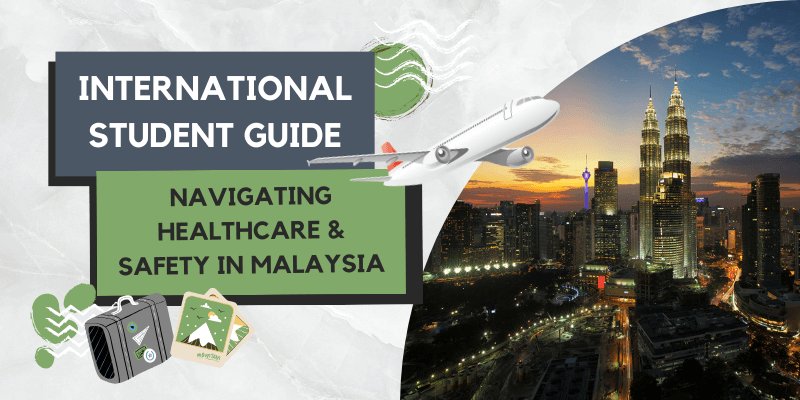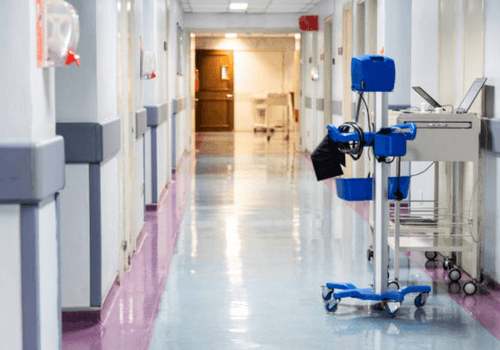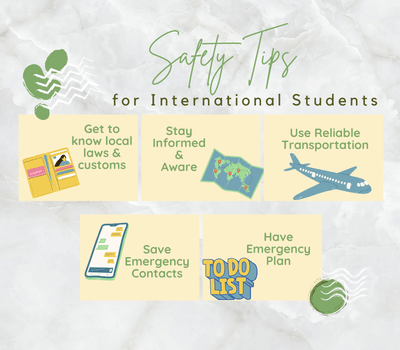International Students Healthcare Guide in Malaysia
February 19, 2024
Anis

Safety and health are essential aspects of everyday life, but they become even more critical when you study abroad.
Navigating new environments with a lack of familiar support systems can be tricky; thus, being well-prepared ensures a smooth transition.
If you are planning to further your studies in Malaysia, don’t worry – we have done the research for you!
This article will guide you through crucial elements of healthcare and safety tips tailored for international students in Malaysia.
What should international students know about Malaysia’s healthcare system?

Malaysia’s healthcare system encompasses public and private sectors; both of which are accessible to international students.
Public hospitals and clinics offer cost-effective medical services such as consultations, treatments and medications.
Private healthcare, on the other hand, is readily accessible, albeit at a slightly higher price due to additional services provided.
The extra services offered typically include amenities such as private rooms, shorter waiting times and access to advanced medical technology.
Additionally, you may have more flexibility in choosing your preferred doctor or specialist, and may receive more personalized care catered to your specific needs.
Most universities also offer on-campus healthcare services, with doctors and nurses available to attend to any needs that may arise.
Is health insurance mandatory for international students in Malaysia?
Yes, health insurance is mandatory for international students who wish to study in Malaysia. .
Insurance policies must be purchased locally and remain valid throughout the duration of your study.
Through your institution, you can opt to either one of the following medical insurances offered by:
- Etiqa Family Takaful Berhad (EFTB)
- Great Eastern Takaful Berhad (GETB)
- The Pacific Insurance Berhad (TPIB)
These insurance policies adhere to the minimum coverage criteria established by the Ministry of Higher Education (MOHE).
Alternatively, there are other private insurance options that offer varying levels of coverage and benefits.
For instance, some insurance plans may provide comprehensive coverage for medical expenses, some may offer financial security in case of an unexpected serious medical treatment.
Apart from medical insurance, there are supplementary insurance plans that you might want to look into such as travel insurance and personal accident insurance.
Before purchasing any insurance policy, you must carefully review the terms and conditions of each insurance policy to ensure it meets your specific needs.
What should students do in case of a medical emergency?
Offering some of the best healthcare services in Southeast Asia, Malaysia has the expertise, personnel, and facilities to manage a wide range of medical conditions.
It is fairly easy to find medical services as every city in Malaysia has round-the-clock healthcare facilities, complete with proficient emergency response teams stationed at major hospitals.
For safety measures, it is best for you to keep details of the nearest 24-hour clinics, emergency hotlines and ambulances services.
In cases of emergencies that need immediate attention, dial 999 from a landline or 112 from a mobile phone.
Calling these numbers will connect you to emergency services including police, fire, medical and civil defense.
Alternatively, in cases of medical emergencies where you have no means of transportation to get to a healthcare facility, call your nearest hospital and request for ambulance assistance.
What other wellness resources available for international students?
Recognizing the challenges international students may face, universities and colleges in Malaysia often offer various support services to promote their overall wellness, including mental well-being.
This initiative also ensures you have access to resources that can help you deal with adjusting to your new environment.
1. Counseling services
In Malaysia, universities typically provide counseling services tailored to your needs.
These services are usually free or available at a minimal cost and offer a safe space for you to discuss your concerns. The concerns include academic pressures, cultural adjustment, homesickness, or personal issues.
Trained counselors can provide guidance, support, and practical strategies to help you manage stress, enhance mental resilience, and improve overall well-being.
2. Workshops, seminars, or support groups
Higher institutions in Malaysia also may arrange workshops, seminars, or support groups specifically addressing your mental health needs.
These programs often cover topics like stress management, mindfulness, coping strategies, and building social connections.
Participating in such activities not only helps you acquire valuable skills but also fosters a sense of community and belonging, which is essential for mental health.
3. External support services
In addition to on-campus resources, you can also access external support services as an international student in Malaysia.
These may include helplines, online counseling platforms, and mental health organizations that offer information, advice, and referrals to relevant professionals if necessary.
Additionally, some universities collaborate with local healthcare providers to ensure you have access to quality mental health care when needed.
What safety tips should students studying in Malaysia keep in mind?

Aside from medical care and self-care, the importance of personal safety cannot be overstated.
Here are five essential tips tailored to international students in Malaysia:
1. Familiarize yourself with local laws and customs
Malaysia is a diverse country with many different ethnicities, languages and religions.
Take the opportunity to embrace the diverse cultural landscape and understand the laws of Malaysia to ensure a safe and enriching experience while you’re here.
2. Stay informed with current events
As an international student, staying informed and aware of current events and safety advisories is crucial.
By keeping up-to-date with news and safety alerts, you can make informed decisions and adjust your plans accordingly.
This proactive approach helps you foster a sense of security and confidence navigating your day-to-day life in Malaysia.
3. Use reliable transportation
Utilizing reliable transportation options is important for your safety and convenience in Malaysia.
Opt for licensed taxis, ride-sharing services, or university-provided shuttles to ensure safer travels, especially during late hours.
It is recommended to get to know the routes and areas, and maintain vigilance of your surroundings while traveling.
4. Save Malaysian emergency contacts
Make sure you are familiar with Malaysian emergency contacts including local police, ambulance services and university hotlines.
In case of emergencies, having these numbers saved in your phone can be invaluable, saving precious time and potentially even lives.
5. Have an emergency plan
At all times, share your whereabouts with your family members and friends, even if you are only going to the nearest mall or to another town.
Having an emergency plan in place cultivates a sense of readiness and resilience, providing reassurance that you are prepared to handle any unexpected events effectively.
In conclusion, being an international student requires you to be familiarized with the healthcare system to ensure an enriching experience while studying and living in Malaysia.
Additionally, don’t forget to prioritize your mental health by utilizing the available resources and engaging in self-care practices.
Most importantly, take proactive measures for your own safety and well-being.
Kickstart your education in Malaysia
We'll help you find and apply for your dream university
You might be interested in...
- Sunway University: Malaysia’s Best Cambridge A-Level College with 11 Years of Excellence
- Top Malaysian Universities in QS Asia Rankings 2025
- Sunway University launches New Medical School to transform Healthcare Education
- What to Do After IGCSE/O-Level? Best Study Pathways in Malaysia
- Xiamen University Malaysia Scholarships for International Students in 2025
- Why AI in Education Matters?
- EdUHK Wins Grand Prize at iCAN 2024 Achieves the Best Performance among Hong Kong Universities
- Sunway University Ranked Malaysia's No. 1 Private University in 2025
- A Sunway University Student's Journey from Cerebral Palsy to Graduation
- APU Dominates the 2024 Private Education Excellence Awards with Dual Wins
 +60173309581
+60173309581





